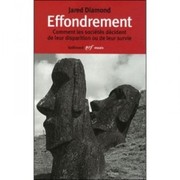UdeRecife reviewed Collapse by Jared Diamond
Review of 'Collapse' on 'Goodreads'
3 stars
You probably know the author from his masterpiece Guns, Germs and Steel. If you do, you know what to expect from this book. The same thorough explanations, the vast array of interconnected factors, all grounded on scientific data.
This is not the book for those who truly want an optimistic view of what the future holds for us. The title says it all: collapse. So the author guides us through many paradigmatic collapses of civilizations that acted either greedy, naively, or simply recklessly.
11 years from its publication and the rate of global destruction has not halted — in fact, it is accelerating, as predicted by those who are often called pessimists. So, in a sense, Jared Diamond’s call to action to make the change happen has not come to fruition. However, if you happen to read this book, you’ll probably become one amongst many contributing to at …
You probably know the author from his masterpiece Guns, Germs and Steel. If you do, you know what to expect from this book. The same thorough explanations, the vast array of interconnected factors, all grounded on scientific data.
This is not the book for those who truly want an optimistic view of what the future holds for us. The title says it all: collapse. So the author guides us through many paradigmatic collapses of civilizations that acted either greedy, naively, or simply recklessly.
11 years from its publication and the rate of global destruction has not halted — in fact, it is accelerating, as predicted by those who are often called pessimists. So, in a sense, Jared Diamond’s call to action to make the change happen has not come to fruition. However, if you happen to read this book, you’ll probably become one amongst many contributing to at least slow down the rate of destruction. And that, by itself, if anything else, makes reading this book something truly worthy of your time.


